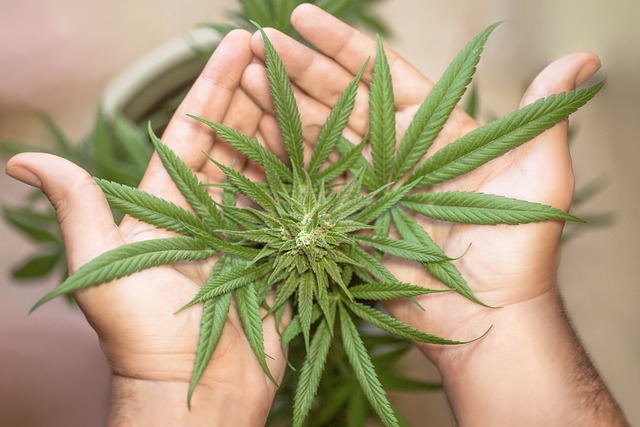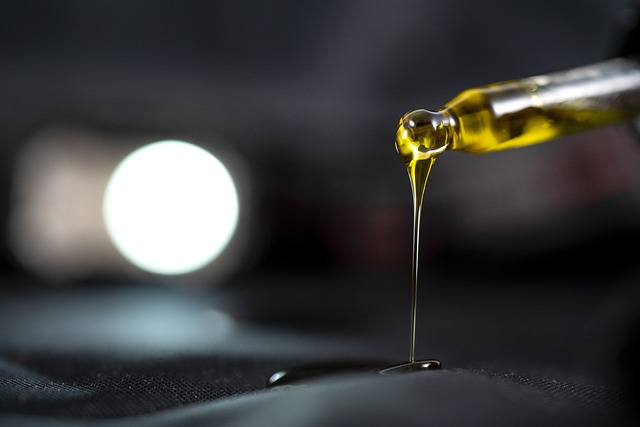2023 saw THCA, a non-psychoactive compound found in cannabis with potential health benefits like anti-inflammatory and analgesic properties, gain legal recognition within Pennsylvania's medical marijuana program. This development is significant as it allows for the exploration of THCA's therapeutic effects by certain patients under a practitioner's certification. THCA's legality in Pennsylvania hinges on its sourcing from hemp compliant with the 2018 Farm Bill, ensuring it contains less than 0.3% THC. This has led to an increase in THCA offerings in local dispensaries, satisfying a growing consumer demand for cannabinoid products within state regulations. The expansion of THCA availability in Pennsylvania is indicative of a broader national trend towards examining the health benefits of various cannabinoids. Research into THCA's potential has been heightened, with an emphasis on its anti-inflammatory, neuroprotective, and analgesic properties. As THCA is now legal in Pennsylvania, residents have the opportunity to engage with this compound for wellness purposes within a regulated environment, with the expectation that ongoing studies will further clarify its full potential.
Explore the therapeutic properties and legal landscape of THCA (Tetrahydrocannabinolic Acid) flowers, a non-psychoactive cannabinoid gaining attention for its potential health benefits. This article navigates through the regulatory framework governing THCA legality in Pennsylvania and provides insightful guidance on how residents can harness these benefits responsibly. Dive into the world of THCA and its advantages with our comprehensive exploration tailored to Pennsylvania’s unique legal context.
- Exploring THCA Flower Benefits: Is It Legal in Pennsylvania?
- THCA Legal Status and Advantages: A Deep Dive into Pennsylvania's Regulations
- Harnessing the Potential of THCA Flowers: A Guide for Pennsylvanians
Exploring THCA Flower Benefits: Is It Legal in Pennsylvania?

2023 has seen a significant shift in the legality and perception of cannabis-related compounds, including THCA or tetrahydrocannabinolic acid, a non-psychoactive precursor to THC found in raw cannabis flower. In Pennsylvania, the legal landscape surrounding THCA is evolving, with clear guidelines being established. Under Pennsylvania’s Medical Marijuana Program, products that contain THCA are permissible for certain patients who have received certification from a practitioner. This has opened avenues for research and exploration into the potential benefits of THCA flower, which some claim may include anti-inflammatory, neuroprotective, and analgesic properties without the psychoactive effects associated with THC. As such, consumers and medical professionals in Pennsylvania are increasingly looking into THCA as a legal alternative for wellness and health management.
The legality of THCA in Pennsylvania is contingent upon its derivation from industrial hemp compliant with the 2018 Farm Bill, which federally legalized hemp provided it contains less than 0.3% THC. This distinction is crucial for consumers, as it demarcates the legal boundaries within which they can access and benefit from THCA products. With an increasing number of dispensaries offering THCA flower and derivative products, Pennsylvanians have a growing selection of cannabinoid-based options that align with state regulations. The scientific community is also taking interest in THCA’s potential therapeutic benefits, which could further solidify its place within the legal framework of Pennsylvania’s health and wellness market.
THCA Legal Status and Advantages: A Deep Dive into Pennsylvania's Regulations

In recent years, the legal landscape surrounding THCA (Tetrahydrocannabinolic Acid), a non-psychoactive cannabinoid found in raw cannabis plants, has evolved, particularly within the state of Pennsylvania. As of the latest updates, THCA is legal in Pennsylvania under certain conditions. The state’s regulations allow for the sale and consumption of hemp-derived products containing less than 0.3% THC on a dry weight basis, which includes THCA. This distinction is crucial as THCA itself is non-psychoactive, contrasting with its decarboxylated form, THC, which is psychoactive. The legal clarity has paved the way for businesses to sell THCA products, including flowers, without the need for a medical marijuana card that is required for products containing THC.
Pennsylvania’s regulations reflect a broader trend of states across the U.S. cautiously embracing cannabinoids beyond THC and CBD (Cannabidiol), recognizing their unique benefits. THCA flower, specifically, has gained attention for its potential therapeutic properties, including anti-inflammatory, neuroprotective, and analgesic effects, which are being studied to further understand their applications. The legal status of THCA in Pennsylvania enables researchers and consumers alike to explore these advantages, contributing to a growing body of knowledge about the cannabinoid’s potential health benefits. As such, the state has become a focal point for those interested in the therapeutic properties of THCA, offering a regulated environment where its advantages can be safely and legally experienced.
Harnessing the Potential of THCA Flowers: A Guide for Pennsylvanians

In recent times, the conversation surrounding cannabis and its derivatives has shifted significantly, especially with the rise of interest in the therapeutic potential of cannabinoids. Among these, Tetrahydrocannabinolic Acid (THCA) has garnered attention for its health benefits, which are distinct from those of its decarboxylated form, THC. For Pennsylvanians looking to harness the potential of THCA flowers, it’s crucial to understand their legal status and the ways in which they can be utilized effectively. As of the knowledge cutoff date, THCA-rich cannabis flowers are legal under Pennsylvania’s Medical Marijuana Program for registered patients with qualifying conditions. This legality opens up avenues for individuals to explore the purported benefits of THCA, which include anti-inflammatory and neuroprotective properties without the psychoactive effects associated with THC.
To fully embrace the advantages of THCA flowers in Pennsylvania, users should consider proper storage to maintain their potency, as THCA degrades into THC and CBN upon exposure to heat and light over time. Additionally, consumers are encouraged to purchase from reputable sources to ensure they are obtaining high-quality products free from contaminants. The method of consumption also plays a significant role; while some prefer smoking or vaporizing for immediate effects, others opt for THCA-infused edibles or topicals to experience longer-lasting relief. Regardless of the chosen method, understanding the nuances of THCA and its legality in Pennsylvania is the first step towards safely experiencing its potential health benefits. With the ever-evolving landscape of cannabis laws and research, Pennsylvanians can look forward to a future where the full spectrum of cannabinoids is better understood and utilized for wellness.
In conclusion, the emergence of THCA flower as a subject of interest among Pennsylvanians is tied closely to its legal status within the state. As explored, THCA, or tetrahydrocannabinolic acid, possesses potential therapeutic benefits that are being increasingly recognized. With a clear understanding of Pennsylvania’s regulations surrounding THCA legality, consumers and patients can make informed decisions about incorporating this cannabinoid into their wellness routines. The guide provided offers a comprehensive approach to harnessing the advantages of THCA flowers, ensuring that those interested in exploring its benefits can do so within the confines of the law. As research continues to unfold the myriad ways THCA may contribute to health and well-being, it’s clear that this non-psychoactive compound holds promise, particularly for those seeking alternative or complementary options for health support.
